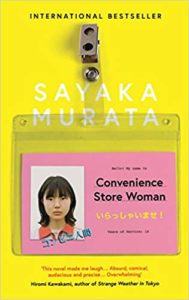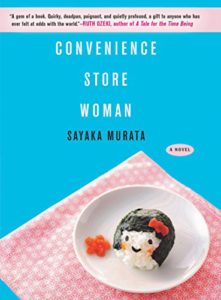Convenience Store Woman was originally published as Conbini ningen (Bungeishunju Ltd., Tokyo, 2016)
Ginny Tapley Takemori talks with Books on Asia about translating “Convenience Store Woman,” for the English audience

Books on Asia: Convenience Store Woman challenges us to reconsider how we should define a “normal person” in modern society and prods us to accept people who may be different from our own ideal of what is “normal” or even acceptable. In some ways, Japan seems a more traditional society from the US or UK when it comes to marriage, family and a good job being universal and absolute norms.
Takemori: I think the pressures on individuals to get married, have a career and so forth, are very present in other countries too, although perhaps not quite to the same extent—or in the same way—that they are in Japan. In this respect the central issues in the book are universally understandable and I didn’t really have to work hard to bring those across. Of course the multi-faceted convenience store is a very Japanese phenomenon, so I did have to actively work to bring it alive in the imagination of readers who have never experienced it—but really, Murata’s descriptions are so detailed that most of the time the original speaks for itself.
BOA: What kind of cultural sensitivities (regarding mental health, for example) did you have to consider when translating the story into English? One Books on Asia reader questioned whether Keiko is perhaps autistic. Is this something that was addressed in the original? Do you think it even matters?
Takemori: I think Murata wanted to create a character who was absolutely logical in her approach to life, utterly non-emotional, non-judgmental, and lacking in what society as a whole would call common sense, as a way to examine what society generally thinks of as “normal.” Through Keiko’s hyperlogical perspective, we can see how illogical and rather odd “normality” actually is. However, all readers will bring their own life view and experience to their reading of a book. Perhaps you can say it’s a kind of reverse cultural sensitivity, which in itself is quite interesting. I would hope, though, that giving a label to Keiko’s “abnormality” doesn’t detract from the novel’s main purpose of highlighting how very strange “normal” actually is.
BOA: One of the things a couple of BOA readers have mentioned about the book is how short it is. I don’t know how many pages it is but my Kindle told me I could read it in 3 hours. One BOA reader even felt the book was too short and that the author could have spent more time explaining some of the issues.

Takemori: It is on the short side, only around 150 pages in the original Japanese and 160 pages in the English. Perhaps you could say it is more a novella than a novel, although it was published originally as a novel in Japan (the hardcover edition alone sold over 600,000 copies). I don’t think there are such rigid criteria in Japanese publishing, and you often get very short novels. For the English edition of Convenience Store Woman there had been an idea of possibly publishing it together with some short stories, but when the editor read the full translation he decided it was strong enough to work in a standalone edition, which I think was absolutely the best decision, and true to the original.
BOA: Yes, and we have novellas in the English world as well. Come to think of it, “The Perks of Being a Wall Flower,” a coming-of-age novel by Stephen Chbosky, is extremely short, but seems to be just enough. There is also the keitai shosetsu short novel in Japan. Can you explain this genre?
Takemori:The keitai shosetsu genre is where authors (usually hiding their identity behind a pen name) write installments of a novel on their cell phone and send them out directly to a subscription mailing list via email, SMS or website. I’m not sure to what extent Murata may have been influenced by the trend, any more than other young novelists writing in Japan today, but I can say that she is a superb literary author, a master of the short-story, and is a well-established novelist (most of her novels are a more conventional length of around 250 pages).
BOA: Being British, did you translate into British English or American English? Personally, I wish American publishers wouldn’t change British English spelling and references because I feel that part of the fun of reading is discovering differences in language. I am curious if Grove Press changed any of the English to account for the American version?
Takemori: I aim for a literary language that is neither particularly British nor American, although of course there will be some influence depending on who I’m translating for. I translated this for Grove Press, an American publisher, and so it is nominally in American English. They changed very little of my translation beyond normal editing. There are peculiarities of phrase such as “Thank you for your custom” but my intention here and elsewhere was to create a formulaic-sounding language to roughly approximate the manual-dictated customer service language (baito keigo as it’s known in Japanese) in which there is really no equivalent for in English. It shouldn’t sound too natural! That said, yes, I do find it a bit sad that American publishers generally change British English to cater to their readers. British publishers rarely do this, and UK readers are quite accustomed to handling all types of English from around the world, which I feel adds to the richness of the reading experience.
BOA: Several themes in the book should make us pause for further thought. The convenience store provides a safe, predictable place, an environment which allows certain people to thrive in a more facile job. Such people might not appreciate the lack of a routine or the unpredictability of a job in a more challenging work environment. “The convenience store is a normalized environment” is brought up a few times by Keiko, the main character. She takes comfort that as long as you wear the uniform and repeat the set phrases, customers will see you as “staff” and won’t ask you any questions beyond where a certain product is shelved. In addition, as “staff” you only have to suggest the special of the day. Even two of the long-term customers comment that “This place doesn’t really change, does it?”

Takemori: In Japan, working in a convenience store is seen as a very temporary job filled by students and housewives. There is a manual to dictate every work function and phrases to use with customers, and this is practiced daily at the start of every shift—and is necessary to ensure continuity for an ever fluid workforce. But for Keiko, it functions like a manual for life generally. She is unable to function outside that predictable environment, and even finds comfort in the routine and satisfaction in doing the job to perfection.
BOA: The convenience store also allows someone like Shiraha, the new employee, to fulfill his desire to “just breathe without anyone interfering in my life.” But even he doesn’t really fit the convenience store mold, revealing how contradictory we humans are, if indeed we are even human.
Takemori: Shiraha is an outsider too, but there is a fundamental difference between him and Keiko: Keiko doesn’t resent society, she wants to fit in but doesn’t know how, whereas Shiraha probably could fit in but doesn’t want to, and resents the pressure on him—whether in the store or anywhere else. His response to this is to retreat and hide from society, but this won’t work for Keiko—in fact, when she loses the predictable environment of the store, she is left rudderless and falls apart.
BOA: Yes, I felt that she had lost her ikigae (reason for being) once she gave up her job. And I guess many of us feel that way when we lose or give up a job, no matter what kind of job it is. Many people really struggle to adjust to not having a job when they retire at an advanced age, for example. So maybe Keiko is actually normal.
Takemori: What I find so brilliant about this book is how Murata has, through Keiko’s uncritical, unresentful, uncomprehending but well-meaning gaze, shone a light onto how society works and how utterly strange it actually is. I think this is something not limited to Japan, but is quite universal really, and we would all do well to examine what we take for granted as “normal.”
